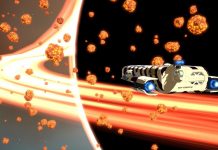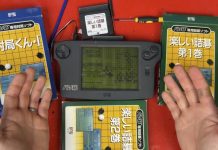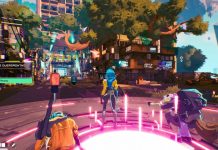There’s a lot you can do with a third dimension. Texture. Nativity dioramas. Spheres. Hyper Light Breaker, in expanding from the 2D action of Hyper Light Drifter, chooses to almost entirely remake itself as a free-roaming roguelike, trading post-apocalyptic pixel art for big proc-gen vistas and even more acrobatic swordplay.
Its technical ambition, sadly, ends up undermined by the emptiness of its world, the lack of exploratory pleasure that Drifter nurtured so well, and combat that’s more faithful to the original yet doesn’t quite adapt well enough to 3D. Not to mention it has more than its fair share of early access bugs and, especially in the early stages, balancing missteps.
On what might well be the other side of the universe to Hyper Light Drifter’s scarred ruins, you are a Breaker, warping from a (really rather tidy-looking) city-settlement into the Overgrowth: the colourful, if perilous realm of a big baddie named the Abyss King. Go in, acquire better swords and guns, kill the Crowns – the King’s lieutenants – and maybe you’ll get a pop at the big man himself. It’s a largely conventional roguelike setup, save for the opportunity to end a run by extracting rather than winning or dying, in which case you can preserve your gathered loot and tool up for a fresh incursion.
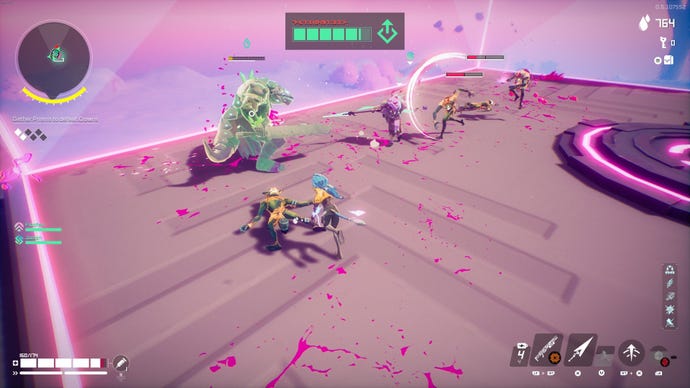
Structurally, it’s fine, and I like how the option for an extraction shooter-style tactical fucking-off means you don’t need to commit to a boss fight for a big crescendo moment. And the fighting – your primary activity during these runs – does successfully replicate some of the original game’s best moves, including its excellent zooming dash. Gear-wise, I found myself barely using the guns, which seem to need multiple upgrades to match the killing power of blades, but did end up becoming attached to a pair of razer claws whose ferocious attack speed paired nicely with my dash addiction.
By the time version 1.0 rolls round, you should also have a choice of nine playable Breakers, each of which has two subclasses that rejig their starting stats and perks. Temper any expectations for truly wacky builds, mind. Only three of those nine are available right now, and while their perks do optimise certain fighting styles, none of them feel night-and-day distinct from one another, and their stat upgrades are so reliant on ultra-rare resources that personalising them takes an age. Your approach is more likely going to be governed by whether you’re wielding light, balanced, or heavy blades, which vary far more in attack patterns and special moves.
The bigger problem is that what works in two dimensions doesn’t necessarily translate well to 3D, at least without more fine-tuning than Hyper Light Breaker currently performs. Once again, you’ll flit between crowds of sci-fi monsters whacking them with knives and letting loose the occasional battery-powered firearm. But while in Breaker you could manage these melees by virtue of a top-down view of the entire scrum, here you’re often just entangled in shapeless, graceless chaos, with far too many cheap shots coming from enemies that can dart in from outside the third-person camera view. Any semblance of Soulslike precision and finesse, which Breaker is still nominally keen on – all but the squishiest foes force you into well-timed dodgedashing, and punish overextension – is lost in these relentless bladestorms. A few minibosses provide exceptions, but these too come accompanied by throngs of minions that are happy to turn duels into mashfests.

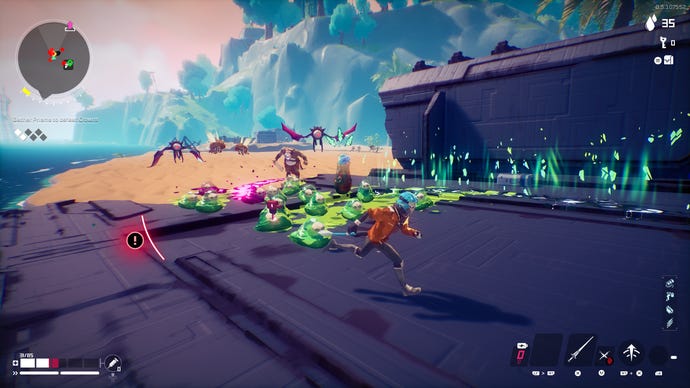
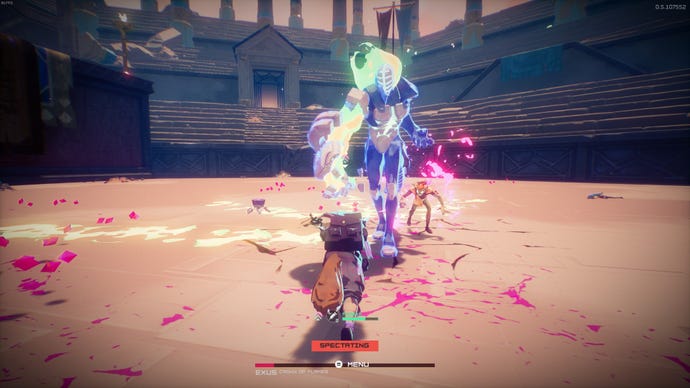
As you can imagine, this all makes for an especially miserable time in the first few hours, where you’ll be scrabbling for basic gear upgrades and won’t even have access to medkits until a few runs in. Even after that, Hyper Light Breaker is weirdly stingy with heals: it will be hours before you can fill out the skill tree enough to carry more than one, and depending on your build, it might not even top you up to a full bar. Nevertheless, the game is happy to pit you against overwhelming crowds and/or big lads with such gigantic HP pools of their own that it can take several minutes of panicked hit-and-run attacks to bring them down.
One answer is to fight numbers with numbers. Combat becomes noticeably more manageable in co-op, which accommodates up to four at a time, and the matchmaking appears smart enough not to team up grizzled, geared-up veterans with less experienced Breakers. I certainly started having more fun when I could mow through the Overgrowth with another pair of blades, although adding more players will also exacerbate the bosses and minibosses’ tankiness problem. The result: regular, invariably awkward sightings of four identical catboy ninjas whaling spectacularly yet ineffectually on stationary rock golems. Two players feels like the sweet spot, being enough to take some of the pressure off that oppressive early period and not enough to populate the world with titanium-lined meatsacks.
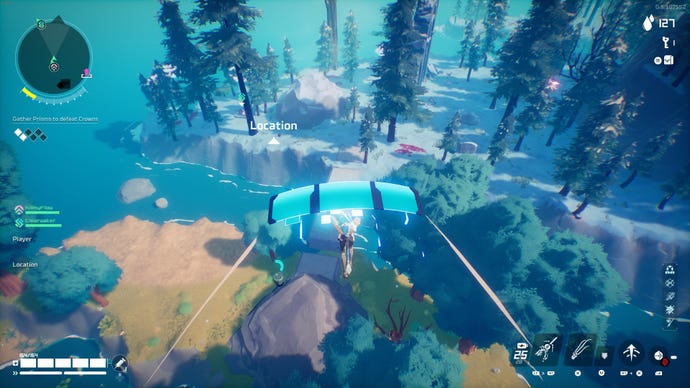
Still, at least it would be populated with something. A procgenned Overgrowth might add surface-level variety to the biomes you’ll fight through, as well as some stakes – die four times and the map is remade, wiping all your previous Crown-slaying progress. But as a gamespace, it’s nowhere near as storied and explorable as Drifter’s post-apocalyptic warrens. Half the fun of that game was poking around for its secrets, uncovering tunnels and treasures that a less curious nose would never sniff out. Hyper Light Breaker’s rewards and collectibles are kind of just… lying there, out in the open. Usually with a map marker pinpointing their exact location, and/or inside a copy-pasted structure that you’ll have visited in a previous run. It’s open-world map design the Starfield way: technically unique, but bereft of the thrill that comes with uncovering hidden prizes in handcrafted nooks.
This isn’t the only quality of Hyper Light Drifter that Breaker forgets about – or at the very least, hasn’t implemented yet. Its micron-thin veneer of a story, for example, is mainly limited to some collectible sketches depicting the Crowns’ rise to power; beyond that, there’s no apparent narrative you can progress yourself, nor many further details about the world you’re allegedly trying to save. That’s also in spite of Breaker watering down Drifter’s presentation, which relied entirely on pictographs and a fictional coded language, to shower you in interfaces and item descriptions in plain English. Maybe that’s a necessary compromise for a game as loot-heavy as this, but it still chips away at the otherworldly vibe that the first game so carefully crafted. Even the music isn’t as evocative and atmospheric, its synths staying oddly reserved outside of boss fights and extractions.
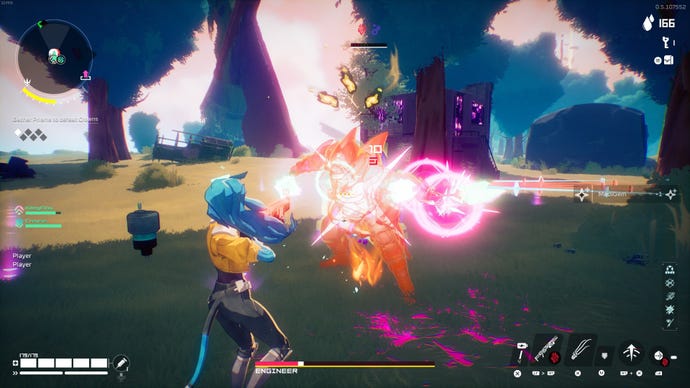
Again, maybe that’s something that can be tweaked further down the early access pipe. Unfortunately, Heart Machine are likely to have their hands full with plenty of nittier, grittier bugs and breakages. Beyond some general performance problems, including the strain of four-person co-op leaving my RTX 3090 struggling to cough up 30fps at 1440p, Hyper Light Breaker is rife with little issues: disconnected players still appearing in the UI, Y-axis camera inversion not working while aiming, enemies turning invisible, enemies getting stuck inside level geometry until they pop out to hit you… At one point, an Engineer miniboss spawned in, took about three hits, then suddenly hurtled off into the sky like Team Rocket at the end of a Pokémon episode. That one got a rare laugh out of me, at least.
Less funny is how this launch version also doesn’t even have the feature-completedness of an alpha build. At least some of the fightable Crowns are other Crowns acting as placeholders, which means a deep run will probably see you battling the same sword-wielding wolf several times in a row. And, as a grand finale of underwhelmingness, reaching the Abyss King himself reveals that he isn’t actually in the game yet either – you’re just shown a static screen and have to pay some of your resources to reset the Overgrowth, just as you would if you’d reached the four-death limit.

The real meat of a roguelike is, to be fair, not the climactic challenge but the preparation for it: the massing of gear and experience, and the primeval pleasure of Numbers Going Up. As much as Hyper Light Breaker is unfinished and more than slightly broken, its biggest issue is how that meaty part just isn’t all that enjoyable. The combat is awkward, the progression is doddering, and the world isn’t interesting enough to motivate indefinitely repeating visits to it. That makes for an awfully long to-do list, early access or no.
This early access review is based on a retail copy purchased by the writer.























